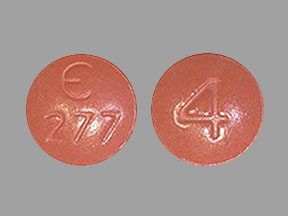Fycompa Disease Interactions
There are 5 disease interactions with Fycompa (perampanel).
Perampanel (applies to Fycompa) renal impairment
Major Potential Hazard, High plausibility. Applicable conditions: Renal Dysfunction
Perampanel should be used with caution in patients with moderate renal impairment, and slower titration may be considered. No dose adjustment is required in patients with mild renal impairment. Care should be taken when prescribing this agent in patients with renal impairment, and close monitoring of renal function is recommended. The use of perampanel in patients with severe renal impairment or patients undergoing hemodialysis is not recommended.
Antiepileptics (applies to Fycompa) suicidal tendency
Moderate Potential Hazard, Moderate plausibility. Applicable conditions: Depression, Psychosis
Antiepileptic drugs (AEDs) have been associated with an increased risk of suicidal thoughts or behavior in patients taking these drugs for any indication. Pooled analyses of 199 placebo-controlled clinical studies involving the use of 11 different AEDs showed that patients receiving AEDs had approximately twice the risk of suicidal thinking or behavior compared to patients receiving placebo. AEDs should be administered cautiously in patients with depression or other psychiatric disorders; phentermine-topiramate should be avoided in patients with history of suicidal attempts or active suicidal ideation. The risk of suicidal thoughts and behavior should be carefully assessed against the risk of untreated illness, bearing in mind that epilepsy and many other conditions for which AEDs are prescribed are themselves associated with morbidity and mortality and an increased risk of suicidal thoughts and behavior. Patients, caregivers, and families should be alert to the emergence or worsening of signs and symptoms of depression, any unusual changes in mood or behavior, or the emergence of suicidal thoughts or behavior. If patients have symptoms of suicidal ideation or behavior, a dosage reduction or treatment discontinuation should be considered.
Perampanel (applies to Fycompa) elevated triglycerides
Moderate Potential Hazard, Moderate plausibility. Applicable conditions: Hyperlipidemia
Increased levels of triglycerides have occurred in patients using perampanel. Care should be taken when prescribing this agent to patients with high triglycerides levels, and close monitoring of lipid profile is recommended during therapy.
Perampanel (applies to Fycompa) weight gain
Moderate Potential Hazard, Moderate plausibility. Applicable conditions: Obesity
Weight gain has occurred with the use of perampanel. Care should be taken when prescribing this agent to patients predisposed to weight gain, and regular monitoring of weight is recommended.
Perampanel – hepatic impairment
Moderate Potential Hazard, Moderate plausibility. Applicable conditions: Liver Disease
The use of perampanel in patients with severe hepatic impairment is not recommended. Dosage adjustments are recommended in patients with mild or moderate hepatic impairment as the half-life of perampanel may increase in these patients. Care should be exercised when prescribing this agent to patients with hepatic impairment, and close monitoring of liver function is recommended.
Switch to professional interaction data
Fycompa drug interactions
There are 332 drug interactions with Fycompa (perampanel).
Fycompa alcohol/food interactions
There are 3 alcohol/food interactions with Fycompa (perampanel).
More about Fycompa (perampanel)
- Fycompa consumer information
- Check interactions
- Compare alternatives
- Pricing & coupons
- Reviews (67)
- Drug images
- Side effects
- Dosage information
- During pregnancy
- Generic availability
- FDA approval history
- Drug class: AMPA receptor antagonists
- Breastfeeding
- En español
Related treatment guides
Drug Interaction Classification
| Highly clinically significant. Avoid combinations; the risk of the interaction outweighs the benefit. | |
| Moderately clinically significant. Usually avoid combinations; use it only under special circumstances. | |
| Minimally clinically significant. Minimize risk; assess risk and consider an alternative drug, take steps to circumvent the interaction risk and/or institute a monitoring plan. | |
| No interaction information available. |
See also:
Further information
Always consult your healthcare provider to ensure the information displayed on this page applies to your personal circumstances.


